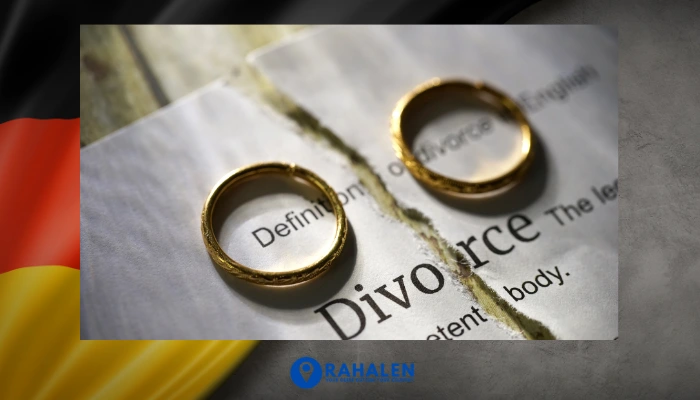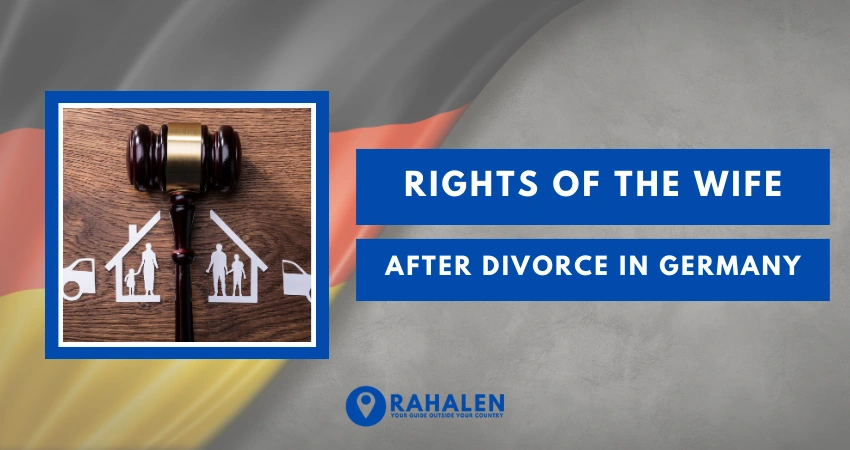The rights of the wife after divorce in Germany are among the crucial topics that concern immigrants, especially females, particularly in cases where they travel with German men after marriage or agreement. In Germany, there are clear laws that define the rights of the wife in the event of marriage failure or divorce. Understanding these laws is the essence of our article today.
Rights of the wife after divorce in Germany

Germany is one of the countries that does not consider marital infidelity as grounds for divorce. Instead, divorce is viewed based on the lack of agreement between the parties, leading one of them to seek separation. German laws do not explicitly address extramarital relationships as they do in many Western societies.
Divorce is considered one of the most challenging aspects of personal relationships, governed by the legal principle of breakdown, occurring when the parties are in complete disagreement to the extent that living together becomes untenable. Complicating matters further is the presence of children between the parties.
Many people, especially mothers, inquire about the rights of the wife after divorce in Germany. In contrast to European societies, German law fairly grants rights to the wife after divorce. These rights can be categorized into:
- Child custody.
- Property rights.
- Retirement rights.
- Alimony rights.
Child Custody
German law takes a neutral stance on this matter, granting equal rights to both spouses regarding child custody and care. In practice, the actual care of the children often goes to the woman, who typically oversees their well-being until the child reaches the age of ten. Afterward, the child has the choice of staying with either parent.
In most cases, children choose to stay with their mothers. However, in rare situations, they may choose their fathers. Regardless of the child’s choice, the other parent has the right to visit and spend time with the child without the objection of the other party.
Property Rights
Among the rights of the wife after divorce in Germany are property rights, which can be divided into personal and shared properties.
For example, personal properties like jewelry, gifts, accessories, and clothing, as well as hygiene items, are considered personal belongings that the wife easily acquires in case of mutual agreement. However, if separation involves complications, the matter is left to the discretion of the court.
The situation differs concerning shared properties such as real estate, furniture, or a car. Two methods can be followed:
- The first method involves division through mutual agreement between the spouses, which is cost-effective for both parties.
- The second method involves division through a court decision, which is costly and requires a lengthy process.
In the case of a jointly owned car, it is assigned to the person whose name it is registered under, who is then responsible for paying half of its cost to the other party or exchanging it with another property.
Retirement Rights
One of the crucial rights of the wife after divorce in Germany pertains to retirement rights. German law is considered among the best in Europe in this regard.
Retirement benefits are evenly divided during the period of cohabitation, ensuring the woman’s contribution, whether through work or child-rearing. This guarantees that the woman receives her fair share of the retirement benefits for the period she contributed, enabling her to live with dignity in old age without relying on others for support.
Alimony Rights
Alimony, typically associated with the wife in our Arab culture, takes a different form in Germany. It depends on which party has a higher income. Alimony is payable to both the wife and husband.
In cases of divorce, the court takes this into consideration, and in many instances, alimony rights may be waived due to the financial circumstances of the paying party. In specific cases, an agreement may be reached between the spouses for a specified amount at certain intervals, which the court may approve without issues.
How much alimony should the husband pay to the wife after divorce?
The court determines the amount of alimony that the husband is obligated to pay to the wife after divorce, based on the following factors:
- Income of the spouses: The court considers the income of both spouses, including earnings from work and income from other sources, such as retirement benefits.
- Wife’s needs: The court takes into account the needs of the wife, including basic living expenses such as food, housing, clothing, and healthcare.
- Duration of the marriage: The duration of the marriage is considered, with the belief that couples married for a longer period deserve higher alimony.
- Wife’s earning potential: The court considers the wife’s potential to earn a living, with the belief that a wife with good earning prospects deserves lower alimony.
In general, the alimony that the husband is required to pay to the wife after divorce is an amount sufficient to meet the basic needs of the wife.
Child Support in Germany After Divorce
Among the rights of the wife after divorce in Germany is child support in cases where she has custody. In such situations, the father becomes obligated to pay child support separately from any child support benefits received. Child support amounts have been increased this year, and they can be clarified through the following table:
- Children up to the age of 6: €437 per month
- From 6 to 11 years old: €502 per month
- From 12 to 17 years old: €588 per month
- 18 years and above: €628 per month
Divorce Law in Germany for Refugees
The rights of the wife after divorce in Germany for refugees do not differ significantly from those of German citizens themselves. It is well-known that divorce in Germany takes a considerable amount of time due to the lengthy procedures and the duration involved.
Divorce proceedings typically take at least a year, and substantial amounts, often in the thousands, need to be paid. Consequently, refugees may explore alternative ways to obtain a divorce. Some, for instance, initiate divorce proceedings in countries other than Germany to expedite the process.
In this regard, German law is flexible, allowing couples residing in Germany to choose German law for divorce proceedings, regardless of their nationality or where the marriage took place.
divorce process in germany
Getting a divorce in Germany can be a complex process, but it’s important to understand your options and the steps involved. Here’s an overview of the divorce process in Germany:
Grounds for divorce:
- The sole ground for divorce in Germany is the breakdown of the marital relationship beyond repair. This means there is no fault-based system, and the court will not consider who is to blame for the marriage failing.
- The marriage breakdown is usually proven by a separation of at least one year, where both parties agree to the divorce. However, there are exceptions to this rule:
- If one partner contests the divorce, the necessary separation period increases to three years.
- In exceptional circumstances, the court may grant a divorce even if the separation period has not been met, such as if there is domestic violence or mental cruelty.
Steps involved in the divorce process:
- Consult a lawyer: Both spouses are required to be represented by a lawyer in the divorce proceedings. You can find a lawyer specializing in family law through the German Bar Association website.
- File a divorce petition: Your lawyer will file a divorce petition with the Family Court at your residence or that of your partner.
- Court hearing: If both spouses agree to the divorce, there will be a single court hearing, where the judge will confirm the marriage breakdown and issue a divorce decree. There may be multiple hearings if there are contested issues, such as child custody or spousal maintenance.
- Financial matters: The court will also deal with any financial matters arising from the divorce, such as the division of marital assets and debts and spousal maintenance.
- Divorce decree: Once all issues have been resolved, the court will issue a divorce decree, which officially ends the marriage.
Additional things to keep in mind:
- The cost of divorce in Germany can vary depending on the case’s complexity. However, you can expect to pay lawyer’s fees, court fees, and other expenses.
- If you have children, the court will decide their custody and child support based on their best interests.
- Several resources are available to help you through the divorce process, such as mediation services and support groups.
Cost of Divorce in Germany
After discussing the rights of the wife after divorce in Germany, we now address a crucial aspect of divorce proceedings, which is the associated costs influenced by various factors, including:
- Legal Fees: At the start of divorce proceedings, the lawyer taking on the case charges a fee of €250 to provide legal advice before resorting to the court. In some cases, when divorce is amicable, lawyer fees in court are paid and typically range from 5% to 15% of the claimed amount.
- Overall Divorce Costs: The total costs of divorce in Germany encompass lawyer fees, notary fees, property appraiser fees, and court expenses. These costs are calculated using a complex formula.
- Court Costs: The court imposes certain fees in divorce cases, usually ranging from 1% to 5%, especially for divorces settled in one session or simple proceedings. However, if sessions increase due to property division, child custody, or other issues, costs escalate, necessitating payment of notary fees.
This underscores the complexity and expense involved in divorce proceedings in Germany, applicable to both foreigners and German citizens alike. In summary, amicable separation alleviates the burden on both spouses, ensuring the preservation of the wife’s rights after divorce.

